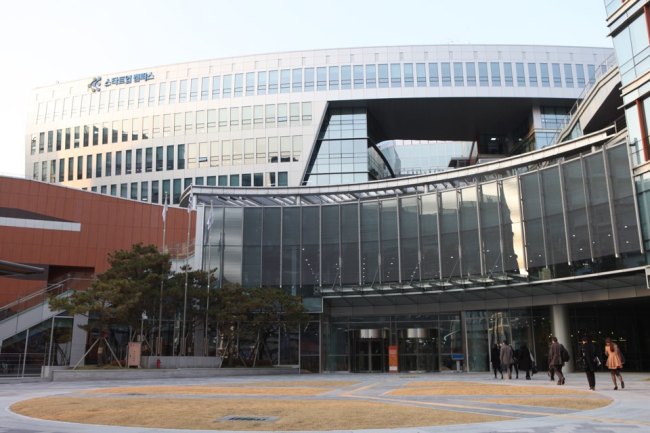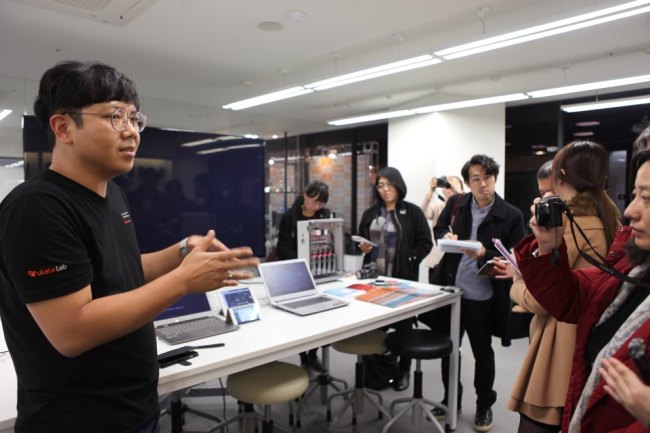[From the scene] Korea's innovation drive meets hurdle, but startups remain determined
By Park Ga-youngPublished : Dec. 30, 2016 - 15:33
The Korea Herald is publishing a series of articles on the moves made by the companies and governments of South Korea, China and Japan in entering the new industry 4.0 era. This is the last installment. -- Ed.

PANGYO, Gyeonggi Province -- The Gyeonggi Center for Creative Economy and Innovation in Pangyo is one of South Korea’s innovation hotbeds with a unique blending of government and big companies.
In mid-November, a group of nine reporters from three countries visited the center and Startup Campus, the largest startup complex in Korea, opened in March 2016, as part of a tour to innovation hubs of Korea, China and Japan.
The reporters arrived in Korea after visiting similar sites in neighboring countries - Zhongguancun Innoway in Beijing and Knowledge Capital in Osaka.
The passion for innovation was equally full at all venues -- whether it was located in a renovated once-publishing cluster like Beijing Innoway or in a shopping center like Osaka’s Knowledge Capital. But one distinctive trait in South Korea was the presentation, ranging from grandiose buildings to professional curators clad in uniform.
Pamphlets were readily prepared in English and female curators helped demonstrate products developed by startups. Even when some of the products did not work, the curator helped leave a good impression with vivid descriptions.
But at the end of the tour, no reporter seemed to know how to define South Korea’s innovation and startup drives under the ambitious appellation “creative economy” touted by embattled President Park Geun-hye.
Some said the government-led center covered too broad a field, while some questioned why innovative drives had to be spearheaded by conglomerates. Some others also pointed out that the startups in operation at the centers were yet to report noteworthy profits.
Starting from September 2014, 18 regional centers of Creative Economy and Innovation opened in the country, with a specialized field and a business group partner.
GCCEI, for instance, is in partnership with telecommunications giant KT Corp. A total of 16 companies including Samsung Electronics, Daumkakao, SK Group, Hyundai Motor and Lotte Group are participating in CCEI operation.
The recent influence-peddling scandal of Park and her close confidante Choi Soon-sill has led to doubts over Park’s creative economy initiatives, partly due to the resemblance of the initiative and two cultural foundations at the center of the scandal. Choi is accused of collecting funds from businesses for the foundations for personal gains.
In the midst of the political scandal, some municipal governments have cut their CCEI budgets, as public sentiment worsened toward Park’s creative economy initiatives. Seoul and South Jeolla Province municipal governments cut back the entire budgets for their centers.
But CCEI is likely to continue next year as they secured a budget worth 43.7 billion won ($36 million) from the central government and 11.9 billion won from municipal governments.
“No one knows what the future holds for the center, especially beyond 2017, but one thing is clear in that support for startups should continue,” said David Sehyeon Baek, director of global cooperation at GCCEI. “We try really hard every day to help more than 1,500 startups and we are doing so without any political agenda.”
Underscoring that CCEI models can also give new opportunities for big companies to seek new business models, Baek added, “It is important to continue these efforts through trial and error instead of scrapping it altogether.”
As of December, the 18 centers supported 1,576 startups, provided 21,415 mentoring sessions, and helped develop 13,529 prototypes, according to the Ministry of Science, ICT and Future Planning.

UlalaLab Inc. a startup founded in 2011 to develop IoT platforms for smart factory, is one of those startups that received support from CCEI.
In June 2015, UlalaLab was selected as one of the seven promising startups at K-Champ, run by the GCCEI and KT Corp. and moved in to GCCEI for the following six months.
The company was given a chance to deliver numerous presentations in front of politicians, businesses and investors from different countries as the successful case of CCEI.
“Gyeonggi CCEI has been a great help in terms of marketing and publicity,” said UlalaLab director Choi Iron Hyun-cheol.
For the future of the country’s innovative industry, experts suggest that the drive should become less controlled by or dependent on the government in order to gain a higher competitive edge.
“In Korea, startups and innovation are being shut down due to many regulations rather than due to lack of government support like CCEI,” said Lee Byung-tae, professor at Daejeon-based research university KAIST.
Lim Jung-wook, managing director of Startup Alliance in Korea, said, “The brand of creative economy might have to change, but efforts to foster startups should continue. Startups are the future of this country.”
By Park Ga-young (gypark@heraldcorp.com)




![[Weekender] Korean psyche untangled: Musok](http://res.heraldm.com/phpwas/restmb_idxmake.php?idx=644&simg=/content/image/2024/05/02/20240502050841_0.jpg&u=)

![[Eye Interview] 'If you live to 100, you might as well be happy,' says 88-year-old bestselling essayist](http://res.heraldm.com/phpwas/restmb_idxmake.php?idx=644&simg=/content/image/2024/05/03/20240503050674_0.jpg&u=)











![[Herald Interview] Director of 'Goodbye Earth' aimed to ask how we would face apocalypse](http://res.heraldm.com/phpwas/restmb_idxmake.php?idx=652&simg=/content/image/2024/05/03/20240503050732_0.jpg&u=)
